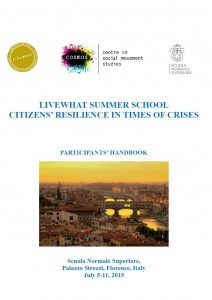SUMMER SCHOOL 2015
LIVEWHAT Summer School on Citizens’ Resilience in Times of Crisis
Florence, 5-11 July 2015
The Summer School on Citizens’ Resilience in Times of Crises sponsored by the LIVEWHAT consortium and organized by the Centre on Social Movement Studies (COSMOS) took place between 5 th and 11th July 2015 at the Scuola Normale Superiore in Florence.
The academic programme of the School addressed three fundamental questions: how do people respond to crises in general and the current economic crisis in particular? What strategies exist to cope with the crisis in the public and private domains, collectively and individually, and through policies, protests and individual behaviors? What forms of resilience does society develop at times of crisis?
The Summer School provided an interactive learning environment where 21 young scholars from around the world attended courses on a number of methods employed in the study of the interlinkages between crises, policy responses, and citizens’ resilience,and on issues of mobilization and alternative forms of action. Participants presented their on-going research projects and received feedback from leading scholars in the field.
Download the Participants Handbook
Keynotes Lectures
Seven keynote speeches from internationally-renowned scholars were delivered.
 Professor Javier Auyero: “In Harm’s Way. The meanings and dynamics of violence at the urban margins”. Drawing
on more than two years of intensive fieldwork in an Argentine
shantytown, this presentation examined the sources, uses, and forms of
interpersonal violence among the urban poor. Professor Auyero argued
that physical aggression has become a habitual way of acting in poor and
marginalized communities, and that violence is routine and carries
across various domains of public and private life. The presentation has
traced how different types of violence—be it criminal, drug related,
sexual, or domestic—overlap, intersect, and blur together. It has also
shown how the state is complicit in the production of harm, and describe
the routines and relationships that endangered residents, particularly
children, establish to cope with and respond to the constant risk that
besieges them and their loved ones.
Professor Javier Auyero: “In Harm’s Way. The meanings and dynamics of violence at the urban margins”. Drawing
on more than two years of intensive fieldwork in an Argentine
shantytown, this presentation examined the sources, uses, and forms of
interpersonal violence among the urban poor. Professor Auyero argued
that physical aggression has become a habitual way of acting in poor and
marginalized communities, and that violence is routine and carries
across various domains of public and private life. The presentation has
traced how different types of violence—be it criminal, drug related,
sexual, or domestic—overlap, intersect, and blur together. It has also
shown how the state is complicit in the production of harm, and describe
the routines and relationships that endangered residents, particularly
children, establish to cope with and respond to the constant risk that
besieges them and their loved ones.
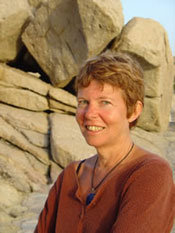 Professor Donatella Della Porta: “Social Movements in Times of Austerity”. This
presentation addressed the anti-austerity social movements mobilization
in the context of a crisis of neo-liberalism. It showed that, in order
to understand their main facets in terms of social basis, strategy, and
identity and organizational structures, we should look at the specific
characteristics of the socio-economic, cultural and political context in
which they developed.
Professor Donatella Della Porta: “Social Movements in Times of Austerity”. This
presentation addressed the anti-austerity social movements mobilization
in the context of a crisis of neo-liberalism. It showed that, in order
to understand their main facets in terms of social basis, strategy, and
identity and organizational structures, we should look at the specific
characteristics of the socio-economic, cultural and political context in
which they developed.
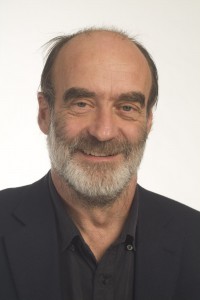 Professor Hanspeter Kriesi: “Mobilizing of protest in the age of austerity”. The
presentation started from McAdam’s and Tilly’s observation that the
inattention to the connection between elections and social movements was
a ‘serious lacuna’ of their Dynamics of Contention and discussed the
relationship between the mobilization by parties on the one hand, and
social movements on the other hand. Next, it introduced some concepts
and theoretical expectations about the mobilization in the electoral and
the protest channel in the Great Recession and how they relate to each
other, distinguishing between a short-term and a long-term perspective.
Third, using the examples of the US, Greece and Spain, it illustrated
how these concepts might be used for the empirical analysis, and how the
expectations might hold up.
Professor Hanspeter Kriesi: “Mobilizing of protest in the age of austerity”. The
presentation started from McAdam’s and Tilly’s observation that the
inattention to the connection between elections and social movements was
a ‘serious lacuna’ of their Dynamics of Contention and discussed the
relationship between the mobilization by parties on the one hand, and
social movements on the other hand. Next, it introduced some concepts
and theoretical expectations about the mobilization in the electoral and
the protest channel in the Great Recession and how they relate to each
other, distinguishing between a short-term and a long-term perspective.
Third, using the examples of the US, Greece and Spain, it illustrated
how these concepts might be used for the empirical analysis, and how the
expectations might hold up.
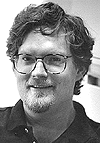 Professor Jeff Goodwin: “Political Responses to the Great Recession in the United States”. This
presentation examined the consequences of the Great Recession in the
U.S. for both institutionalized and non-institutionalized politics. The
key puzzle it has examined was why the recession—unlike the Great
Depression of the 1930s—failed to shift politics in the U.S. decisively
to the left.
Professor Jeff Goodwin: “Political Responses to the Great Recession in the United States”. This
presentation examined the consequences of the Great Recession in the
U.S. for both institutionalized and non-institutionalized politics. The
key puzzle it has examined was why the recession—unlike the Great
Depression of the 1930s—failed to shift politics in the U.S. decisively
to the left.
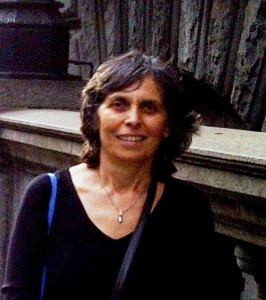 Professor Maria Kousis: “Collective
responses to hard economic times in Greece: from Large Protest Events
against Troika Memoranda and Austerity Policies to Alternative Forms of
Resilience
”. The presentation addressed theoretical issues related
to two basic strategic approaches through which collective bodies
outside the government organized their resources and extended their
network and support structures in order to confront unprecedented
austerity policies and hard economic times in crisis-stricken Greece,
since 2010. It has drawn upon: i) a recent data set of the largest
protest events in Greece during the current crisis, as well as, ii) a
fresh data set of alternative action groups, initiatives and networks in
Greece, produced in the context of the LIVEWHAT project. The findings
were discussed in a comparative perspective, highlighting similarities
and differences with current and former austerity contexts beyond
Greece.
Professor Maria Kousis: “Collective
responses to hard economic times in Greece: from Large Protest Events
against Troika Memoranda and Austerity Policies to Alternative Forms of
Resilience
”. The presentation addressed theoretical issues related
to two basic strategic approaches through which collective bodies
outside the government organized their resources and extended their
network and support structures in order to confront unprecedented
austerity policies and hard economic times in crisis-stricken Greece,
since 2010. It has drawn upon: i) a recent data set of the largest
protest events in Greece during the current crisis, as well as, ii) a
fresh data set of alternative action groups, initiatives and networks in
Greece, produced in the context of the LIVEWHAT project. The findings
were discussed in a comparative perspective, highlighting similarities
and differences with current and former austerity contexts beyond
Greece.
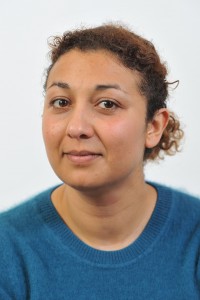 Dr. Magda Osman: “Controlling uncertainty:The psychology of decision-making in complex dynamic real world situations”. This
presentation focused on present insights from psychological evidence
when making decisions in dynamic contexts, the way this type of
decision-making is studied in the lab, and the key theoretical claims
concerning the mechanisms that underpin dynamic decision-making under
extreme uncertainty.
Dr. Magda Osman: “Controlling uncertainty:The psychology of decision-making in complex dynamic real world situations”. This
presentation focused on present insights from psychological evidence
when making decisions in dynamic contexts, the way this type of
decision-making is studied in the lab, and the key theoretical claims
concerning the mechanisms that underpin dynamic decision-making under
extreme uncertainty.
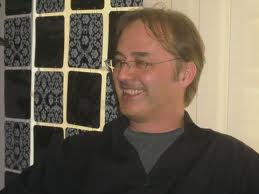 Professor Marco Giugni: “Collective responses to the economic crisis and austerity: the return of grievances?” This
presentation addressed the relationship between economic crisis,
austerity policies, and the collective mobilizations in the public
domain. Empirically, the analysis was based on a random sample of
political claims in nine countries (Britain, France, Germany, Greece,
Italy, Poland, Spain, Sweden, and Switzerland covering 10 years
(2005-2014)).
Professor Marco Giugni: “Collective responses to the economic crisis and austerity: the return of grievances?” This
presentation addressed the relationship between economic crisis,
austerity policies, and the collective mobilizations in the public
domain. Empirically, the analysis was based on a random sample of
political claims in nine countries (Britain, France, Germany, Greece,
Italy, Poland, Spain, Sweden, and Switzerland covering 10 years
(2005-2014)).
Methodological lectures
A series of methodological lectures were given by LIVEWHAT researchers. These included:
- “How to study collective responses to the crisis: protest event and political claim analysis”, by Dr. Manlio Cinalli (SciencesPo) and Dr. Katrin Uba (Uppsala University).
This methodological lecture gave an overview on the development of protest event and political claim analysis in studying collective responses to the crisis. Apart from classic studies that rely on protest events as their coding unit, the session dealt also with newer approaches that turn to alternative coding units by either covering a broader set of units (e.g., political claims ore core sentences) or by disentangling a single protest event into smaller components.
- “How to study individual responses to the crisis: survey and experimental designs”, by Dr. Jordi Munoz (Autonomous University of Barcelona) and Dr. Luke A. Temple (University of Sheffield).
Mainstream studies on the economic crisis have especially focused on macro and meso-level analyses. This methodological lecture gave an overview of the development of survey and experimental designs in studying individual attitudes and behaviors in times of crisis.
- “How to study collective responses to the crisis: qualitative interviews”, by Dr. Lorenzo Bosi (European University Institute) and Prof. Christian Lahusen (University of Siegen).
Interviewing is among the most central methods scholars use in their scientific researches. Through an examination of different studies that employ interviews, we discussed different types of interviews (structured, unstructured and semi-structured), sampling and coding methods, ethical issues, potential problems associated with this research method and how to deal with these issues. Finally, the aim of this lecture was practically oriented to introduce how to conduct good interviews, by gaining the most out of their analysis and writing up.
Papers presentation
To ensure fruitful exchanges, participants were asked to present a paper drawing on a theme of their PhD thesis or other research work. Each presentation was followed by feedback (methodological, analytical, empirical) from a keynote speaker, a methodological lecturer and a peer participant, Then, the floor was open to further discussion on the paper itself or on related issues.
See pictures of our Summer School on Twitter:
https://twitter.com/LIVEWHATproject
LOCATION
The Summer School took place at the Scuola Normale Superiore, at Palazzo Strozzi (in Piazza degli Strozzi).
ORGANISING COMMITTEE
Lorenzo Bosi (Scuola Normale Superiore) and Lorenzo Zamponi (European University Institute).
FINANCIAL AND LOGISTIC SUPPORT
The Summer School was kindly supported by:
- the FP7 project LIVING WITH HARD TIMES: How Citizens React to Economic Crises and Their Social and Political Consequences (LIVEWHAT).
- Scuola Normale Superiore, Istituto di Scienze Umane in Florence;
- Centre on Social Movement Studies (COSMOS) at the Scuola Normale Superiore and the European University Institute.

